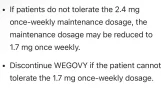I have searched the forum and seen others have been getting high resting heart rate from tirz but didn’t see anyone finding a solution. I’m currently using around 3 mg weekly and mg resting heart rate has gone from 60 to 80 is there anything I can do to help apart from stop the Tirzepatide? Is an increase like that a cause for concern with no other health issues? I know lots of people have a rhr of 80 and my fitness watch tells me my heart rate is average to good for my age group but I’m used to being a lot lower so it’s bothering me.
Navigation
Install the app
How to install the app on iOS
Follow along with the video below to see how to install our site as a web app on your home screen.
Note: This feature may not be available in some browsers.
More options
Style variation
You are using an out of date browser. It may not display this or other websites correctly.
You should upgrade or use an alternative browser.
You should upgrade or use an alternative browser.
Anyone found a solution to high heart rate on Tirzepatide?
- Thread starter Hardtimes
- Start date
Ghoul
Well-known Member
Do we know what that dose is sema and tirz? Great thread
It had been 2.4mg for Sema, but they added 1.7mg as an acceptable dose:

Tirz had been 7.5mg, but they lowered that to 5mg, and recently changed the language to "recommended" , removing the guidance saying treatment should be discontinued if not reached.
songsofpyramids
Well-known Member
It had been 2.4mg for Sema, but they added 1.7mg as an acceptable dose:
View attachment 307787
Tirz had been 7.5mg, but they lowered that to 5mg, and recently changed the language to "recommended" , removing the guidance saying treatment should be discontinued if not reached.
Interesting. My doctor, who seems very knowledgeable about these new drugs (they’re young), saw no problem with me at .5mg longterm for autoimmune issues but maybe they just don’t know about this. Will inquire in a few weeks. Interesting finds as always Ghoul.
Ghoul
Well-known Member
Interesting. My doctor, who seems very knowledgeable about these new drugs (they’re young), saw no problem with me at .5mg longterm for autoimmune issues but maybe they just don’t know about this. Will inquire in a few weeks. Interesting finds as always Ghoul.
Well it looks like while Eli Lilly still lists 1.7mg as the minimum maintainance dose, they just updated prescriber information to eliminate the "discontinue treatment." language.


SubparMarioBro
New Member
Or one of the most interesting in the pipeline, NA-931. Oral small molecule quadruple agonist of GLP-1, GIP, GCG, and IGF-1. Currently in phase 2b trials. Phase 1 trials were interesting: 12.7% weight loss in 12 weeks (outperforming Reta and Tirz) with reportedly mild side effects.Would something like Orforglipron potentially be effective even if a venturous researcher had developed a significant immune response to GLP-1 peptides, or even endogenous GLP-1? Or would a small molecule be vulnerable to cross-reactivity?
Ghoul
Well-known Member
Hang on, so we want to inject GLP1’s IM now?
No.
songsofpyramids
Well-known Member
Hang on, so we want to inject GLP1’s IM now?
No, it absorbs too quickly.
GLP1’s also act on the sinoatrial node of the heart, which is another possible mechanism for the increased heart rate, and why Nebivolol or other beta blockers don’t seem to do a good job at mitigating that.TLDR: It's not associated with cardiac problems and although it increases with dose, as treatment continues it goes down again, This happens because of GLPs effect on the vagus nerve. It lowers blood pressure and increases heart rate.
“The sinoatrial (SA) node is a small, specialized group of cells located in the right atrium of the heart. It acts as the primary pacemaker of the heart, initiating and coordinating the electrical impulses that drive the heartbeat.”
Ghoul
Well-known Member
GLP1’s also act on the sinoatrial node of the heart, which is another possible mechanism for the increased heart rate, and why Nebivolol or other beta blockers don’t seem to do a good job at mitigating that.
“The sinoatrial (SA) node is a small, specialized group of cells located in the right atrium of the heart. It acts as the primary pacemaker of the heart, initiating and coordinating the electrical impulses that drive the heartbeat.”
Nestle is selling peptide spiked protein shots that boost GLP release from the intestines.
https://www.reuters.com/business/re...n-shots-us-weight-loss-drug-users-2024-12-18/
And in other news, The World Health Organization foresees the end of obesity
Similar threads
- Replies
- 54
- Views
- 888
- Replies
- 6
- Views
- 154
- Replies
- 54
- Views
- 2K

